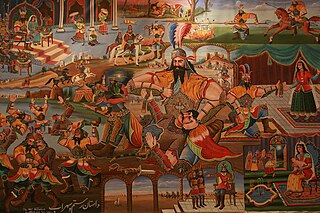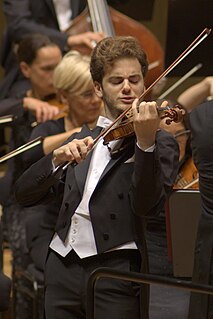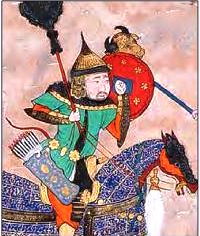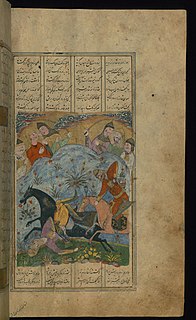Related Research Articles

The Shahnameh or Shahnama is a long epic poem written by the Persian poet Ferdowsi between c. 977 and 1010 CE and is the national epic of Iran, Afghanistan, and Tajikistan. Consisting of some 50,000 "distichs" or couplets, the Shahnameh is one of the world's longest epic poems. It tells mainly the mythical and to some extent the historical past of the Persian Empire from the creation of the world until the Muslim conquest in the seventh century. Iran, Azerbaijan, Afghanistan, Tajikistan were influenced by Persian culture also other countries such as Armenia, Dagestan, Georgia, Turkey, Turkmenistan and Uzbekistan celebrate this national epic.
The music of Iran encompasses music that is produced by Iranian artists. In addition to the traditional folk and classical genres, it also includes pop and internationally celebrated styles such as jazz, rock, and hip hop.

Rostam or Rustam is a legendary hero in Persian mythology, the son of Zāl and Rudaba, whose life and work was immortalized by the 10th-century Persian poet Ferdowsi in the Shahnameh, or Epic of Kings, which contains pre-Islamic Iranian folklore and history. However, the roots of the narrative date much earlier.

Loris Haykasi Tjeknavorian is an Iranian Armenian composer and conductor. He has appeared internationally as a conductor, serving as the principal conductor of the Armenian Philharmonic Orchestra from 1989 to 1998 and later from 1999 to 2000. As a composer Tjeknavorian has written 6 operas, 5 symphonies, choral works, chamber music, ballet music, piano and vocal works, concerti for piano, violin, guitar, cello and pipa, as well as music for documentary and feature films. Among his best known works are the opera Rostam and Sohrab, based on the story of Rostam and Sohrab from Ferdowsi's Shahnameh, and the ballet Simorgh.

Sohrāb or Suhrāb is a legendary warrior from the Shahnameh, or the Tales of Kings by Ferdowsi in the tragedy of Rostam and Sohrab. He was the son of Rostam, who was an Iranian warrior, and Tahmineh, the daughter of the king of Kingdom of Samangan, a neighboring country. He was slain at a young age by his father Rostam. Rostam only found out he was his son after fatally wounding him in a duel. Kaykavous, the king of Iran, delayed giving Rostam the panacea to save Sohrab as he feared losing his power to the alliance of the father and the son. Rostam gave Tahmineh a bracelet as a reminder and a sign to his son.

Aybak is a provincial town, medieval caravan stop, and the headquarters of the Samangan Province in the district of the same name in the northern part of Afghanistan. As an ancient town and major Buddhist centre during the 4th and 5th centuries under the then Kushan rulers, it has the ruins of that period at a place known now as Takht-i-rustam, which is located on a hill above the town.

Tahmina or Tahmineh is a female character in the story Rostam and Sohrab, part of the 10th-century Persian epic of Shahnameh. Her name is mentioned as the wife of Rostam and as the daughter of Samanganshah, the sovereign of Samangan.
Symphonic music in Iran encompasses Iranian musical pieces composed in the symphonic style. In addition to instrumental compositions, some of Iran's symphonic pieces are based on the country's folk songs, and some are based on poetry of both classical and contemporary Iranian poets.

Ahmad Pejman, also spelled as Ahmad Pezhman, is an Iranian classical composer who resides in the United States. Pejman is notable for his operatic and symphonic works.

Behrouz Gharibpour is an Iranian theatre director and pioneer of traditional Persian puppet theatre.
Persian Trilogy is a set of three orchestral works composed by Iranian classical musician, Behzad Ranjbaran. All three works were inspired by stories from the Shahnameh, the Persian epic poem written by Ferdowsi in 11th century. Ranjbaran developed a lifelong fascination about Shahnameh from his childhood growing up in Iran.

The tragedy of Rostam and Sohrab forms part of the 10th-century Persian epic Shahnameh by the Persian poet Ferdowsi. It tells the tragic story of the heroes Rostam and his son, Sohrab.

Darya Dadvar is an Iranian soprano soloist and composer living in Paris, France.
Rostam is a legendary hero in Persian mythology.
The Borzu Nama is a Persian epic poem of about 65,000 couplets recounting the exploits and adventures of the legendary hero Borzu, son of Sohrab and grandson of Rostam.

Emmanuel Tjeknavorian is an Austrian violinist and conductor. His father, Loris Tjeknavorian is the Iranian-Armenian composer and conductor.

Hojir is an Iranian hero in Shahnameh, the national epic of Iran. Hojir is son of Goudarz and brother of Giv and Rohham. Hojir first appears in the story of Rostam and Sohrab.

Houmān not to be confused with Houman, is one of the most famous Turanian heroes in Shahnameh, the national epic of Greater Iran. Houmān is famous for his bravery, loyalty, and chivalry, such that even Iranians who are longtime enemies of Turanians admire his personality. He is a descendant of Tur, a son of Viseh and brother of Piran. Houmān is the highest ranking Turanian commander and after Piran, he is the second leading member of Viseh clan. Houman first appears in the story of Rostam and Sohrab, where Afrasiab sends him with an army of 12,000 men to accompany Sohrab in his journey to Iran. He has been instructed by Afrasiab to not let Sohrab recognize his father, Rostam, so that they fight together and one of them kill the other. Rostam on the deathbed of Sohrab, agreed to promise that he would not hurt Houmān and his army.

Zavara or Zavareh is an Iranian hero in Ferdowsi's Shahnameh. He was brother to Rostam and the son of Zal and played an important role in the Iranian invasion of Turan after the murder of Siyavash by the command of the Turanian king, Afrasiyab. It is said that Zavara killed the Turanian prince Sokhra in the way that the Turanians killed the Iranian prince Siyavash.
And Zavara left the camp [to fight with them], with the god's help and with the shah's will.

Bârmân In the Great War of Iran and Turan the time of Nowzar was. In this war he was of the and one of the commanders of the Afrasiab. Iran-Turan war It happened after Manuchehr death. Until then, Turanian did not dare attack Iran. But after the death of Nowzar Turanians had the opportunity to attack Iran. The King of Iran was killed in the attack and a large part of the country was occupied.
References
- ↑ "Dubai Hosting Puppet Opera of Rostam and Sohrab". www.payvand.com. Retrieved 2022-09-18.
